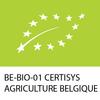FUTURE SALES : 14-16 March 2024, 25-27 April 2024, 6-8 June 2024, 12-14 September 2024, 21-23 November 2024
We are offering meat parcels of 7 kg composed of the following:
€ 155,00
In stock
The sausages, chipolata and minced pork-beef are made with 30% high-quality organic pork.

At the Linciaux Farm, Charolais cattle are reared organically and fed exclusively on grass. Meat from this type of farming offers superior nutritional qualities.
Unlike conventional livestock farms, the cattle are not fattened on cereals, silage maize or soya beetroot cakes. This means that the meat produced contains three times more omega-3 fatty acids and two times less omega-6 fatty acids than traditional meat, even when it is organic.
Grass-fed livestock farming has many advantages. The animals benefit from a lifestyle that suits them: cows are herbivores! So when they digest (ruminate!), they produce little or no methane, unlike when they digest maize, which causes acidity in the cow’s rumen (and therefore methane emissions, which are bad for the environment).
In addition, this method of farming has an ultra-low CO2 footprint. There is no need to transport soya, which often comes from the other side of the world. The cows eat what the meadows produce, which is a real carbon sink (like all plants, grass stores CO2).

